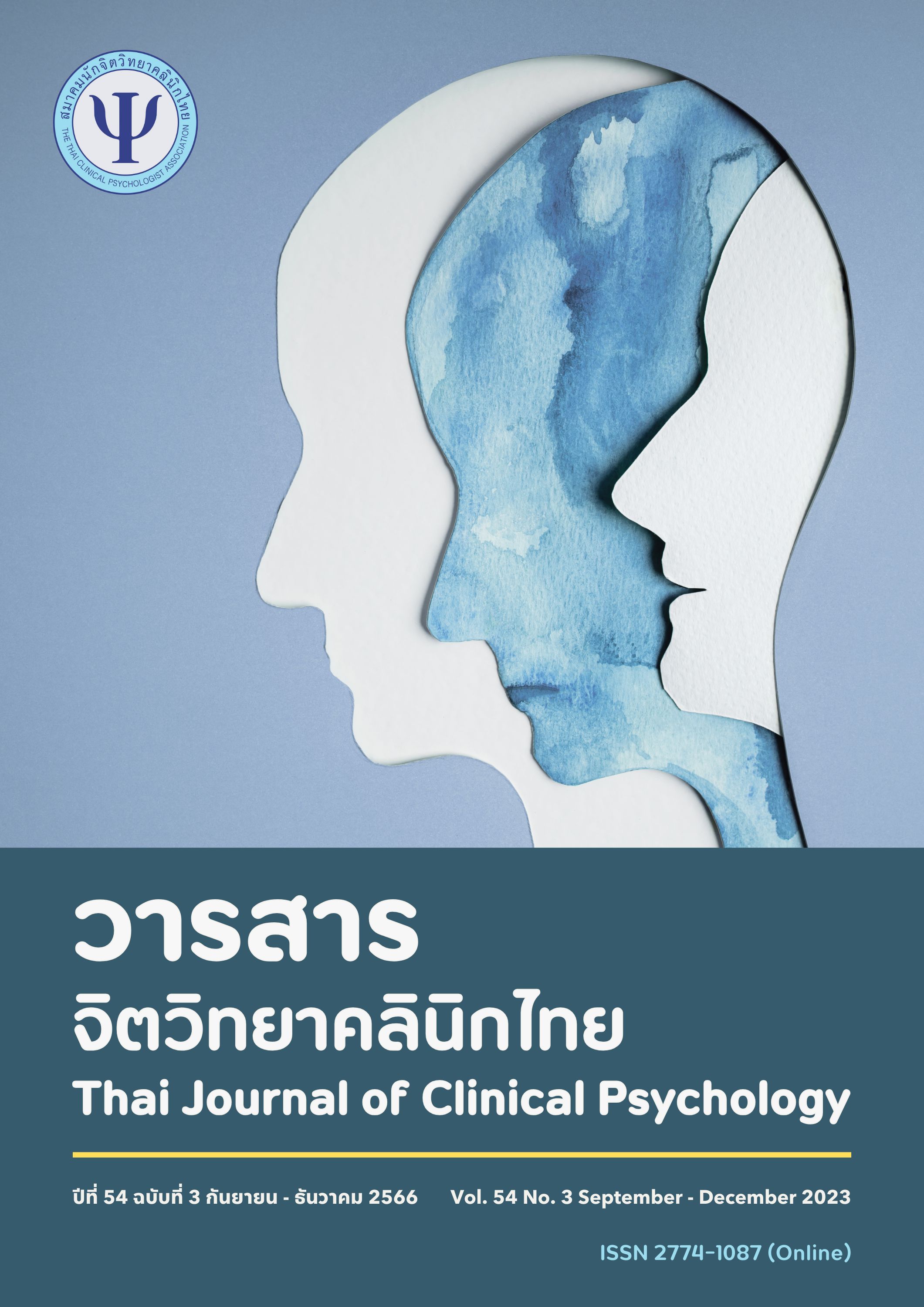ปัจจัยที่สัมพันธ์กับภาวะซึมเศร้าในผู้สูงอายุ เทศบาลตำบลหนองลาด อำเภอเมือง จังหวัดสกลนคร
Main Article Content
บทคัดย่อ
วัตถุประสงค์ เพื่อศึกษาปัจจัยที่มีความสัมพันธ์กับภาวะซึมเศร้าและศึกษาระดับความรุนแรงของภาวะซึมเศร้าของผู้สูงอายุในชุมชน เทศบาลตำบลหนองลาด อำเภอเมือง จังหวัดสกลนคร วัสดุและวิธีการ เป็นการศึกษาวิจัยเชิงพรรณนาแบบภาคตัดขวาง กลุ่มตัวอย่างคือผู้สูงอายุที่อยู่ในการดูแลของโรงพยาบาลส่งเสริมสุขภาพตำบลหนองลาดใต้ตำบลหนองลาด อำเภอเมือง จังหวัดสกลนคร จำนวน 170 คน สุ่มกลุ่มตัวอย่างโดยวิธีการสุ่มอย่างง่าย เก็บข้อมูลโดยการใช้แบบวัดความซึมเศร้าในผู้สูงอายุไทย แบบสอบถามปัจจัยด้านสัมพันธภาพในครอบครัว แบบทดสอบสภาพสมองเบื้องต้นฉบับภาษาไทย วิเคราะห์ข้อมูลโดยใช้สถิติเชิงพรรณนา การวิเคราะห์ค่าความสัมพันธ์ไคสแควร์และค่าสัมประสิทธิ์สหสัมพันธ์แบบสเพียร์แมน ผลการศึกษา พบว่า ปัจจัยส่วนบุคคล ได้แก่ อายุ อาชีพ และโรคประจำตัวมีความสัมพันธ์
กับภาวะซึมเศร้าปัจจัยด้านเศรษฐกิจ ได้แก่ รายได้ต่อเดือนของผู้สูงอายุมีความสัมพันธ์เชิงลบกับภาวะซึมเศร้า ปัจจัยสัมพันธภาพในครอบครัวมีความสัมพันธ์กับภาวะซึมเศร้าโดยเฉพาะด้านการให้ความช่วยเหลือเอื้อเฟื้อเผื่อแผ่ซึ่งกันและกันกับด้านการแสดงออกถึงความผูกพันระหว่างสมาชิกในครอบครัวมีความสัมพันธ์เชิงลบกับภาวะซึมเศร้า และปัจจัยด้านสมองเสื่อม ได้แก่ กลุ่มผู้สูงอายุระดับประถมศึกษามีความสัมพันธ์กับภาวะซึมเศร้า และระดับความรุนแรงของภาวะซึมเศร้าโดยภาพรวม พบว่า กลุ่มตัวอย่างที่ไม่มีภาวะซึมเศร้าร้อยละ 58.20 เริ่มมีภาวะซึมเศร้าร้อยละ 37.60 มีภาวะซึมเศร้าร้อยละ 4.10 สรุป การศึกษาในครั้งนี้ชี้ให้เห็นว่า อายุอาชีพ และโรคประจำตัวมีความสัมพันธ์กับภาวะซึมเศรา้ในผู้สูงอายุรายได้ต่อเดือนไม่เพียงพอและความสัมพันธ์ในครอบครัวที่ลดลงมีความสัมพันธ์กับภาวะซึมเศร้าที่เพิ่มมากขึ้นดังนั้นจึงควรส่งเสริมการดูแลสุขภาพ เสริมสร้างสัมพันธภาพในครอบครัวและส่งเสริมรายได้ให้แก่ผู้สูงอาย
Article Details

อนุญาตภายใต้เงื่อนไข Creative Commons Attribution-NonCommercial-NoDerivatives 4.0 International License.
เรื่องที่ลงตีพิมพ์ในวารสารจิตวิทยาคลินิกแล้วถือเป็นลิขสิทธิ์การเผยแพร่โดยวารสารจิตวิทยาคลินิกแต่เพียงผู้เดียว การตีพิมพ์หรือเผยแพร่ซ้ำในที่อื่นต้องได้รับอนุญาตจากกองบรรณาธิการวารสารฯ
เอกสารอ้างอิง
Cohen, J. (1977). Statistical power for the behavioral sciences (2nd ed). Academic Press.
Chutikankosol, T. (2020, September 9). Depression in the elderly is more dangerous than you think. Samitivej Hospital.https://www.samitivejhospitals.com/th/article/detail/ซึมเศร้าในผู้สูงอายุ(in Thai).
Folstein. (1999, January 3). The mini-mental stateexamination (MMSE). PDF4PRO.https://pdf4pro.com/amp/view/the-minimental-state-examination-mmse-tiffanycare-6af797.html
Foundation of Thai Gerontology Research and Development Institute. (2022, December 31). Statistics of Thai elderly people. https://ltcolder.dop.go.th/th/know/1 (in Thai).
Koolnaphadol, P. (2004). A study and development of family member functioning in families of depressed patients [Master’s thesis Srinakharinwirot University]. Central Library Srinakharinwirot University. http://search.swu.ac.th:1701/permalink/f/1hfhn9m/ALEPH_MONO000079398 (in Thai).
Kleebbua, T. (2018). Factors predicting the severity of depressive symptoms in dementia patients with depression. Journal of Psychiatric and Mental Health Nursing, 32(2), 145-160. (in Thai).
Lotrakul, M. (2019). Faculty of Medicine Ramathibodi Hospital, Mahidol University. https://www.rama.mahidol.ac.th/ramamental/generalknowledge/general/09042014-1017 (in Thai).
Malai, C. (2019). Factors related to depression among the elderly in the community of Ratchaburi Province. Songkhla Nakarin Journal of Nursing, 39(3), 67-76. (in Thai).
Prakobchai, S. (2018). The factors related to the happiness among sexual-and gender-diverse persons. National Research Council of Thailand (NRCT). https://doi.nrct.go.th//ListDoi/listDetail?Resolve_DOI=10.14457/TU.the.2018.749 (in Thai).
Saelim, S. (2019). Prevalence and associated factors of depression in the elderly in Muang District, Ranong Province. Journal of Medical Sciences Region 11, 33(1), 193-102. (in Thai).
Sheikh, J. I., and Yesavage, J. A. (1986). Geriatric depression scale (GDS): Recent evidence and development of a shorter version (pp. 165-173). In T. L. Brink (Ed.). Clinical Gerontology: A Guide to Assessment and Intervention, Haworth Press.
Singhard, S. (2017). Nursing of the elderly with depression, Science and Technology Journal Ubon Ratchathani University, 18(3), 15-24. (in Thai).
Sanitluea, N. Satphet, W. Napha-arak, Y. (2019). Sample size calculation using G*Power program. academic journal Suvarnabhumi Institute of Technology, 41(1), 497 - 507 (in Thai).
Sookkul, K. (2019). Depression in the working-age population: relevant factors and approaches to care. Journal of Phrapokklao College of Nursing Chanthaburi, 30(2), 229-238. (in Thai).
Sonthitham, K. (2020). Factors correlated with depression among the elderly people with chronic disease in community. Roi Et Rajabhat University Journal, 14(2), 192-204. (in Thai).
Supasitthumrong, T. (2022). Depression test. MedPark Hospital. https://www.medparkhospital.com/
disease-and-treatment/depression-tests
The Committee Prepared the Preliminary Brain Test-Thai Version, (1999). The mini-mental examination Thai-2002 (MMSE-2002). Institute of Geriatric Medicine, Department of Medical Services, Ministry of Public Health, Thailand;
(in Thai).
Thai Health Promotion Foundation. (2018, April 5). Changes in the elderly. https://www.thaihealth.or.th/การเปลี่ยนแปลงในผู้สูง-2/ (in Thai).
Wongpakaran, N. (2016). Handbook of caring for the elderly: Antidepressant recipes. Health Systems Research Institute. (in Thai).
Wongtrakulruang, P. (2021, May 17). Elderly people with depression family members should understand. Nakornthon Hospital. https://www.nakornthon.com/article/detail/ผู้สูงอายุกับภาวะซึมเศร้า


